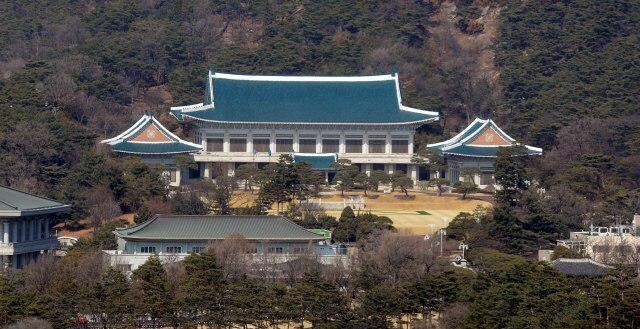hankyoreh
Links to other country sites 다른 나라 사이트 링크
Blue House says GSOMIA termination will proceed unless Japan withdraws export controls

With several key US national security figures voicing concerns about South Korea and Japan’s General Security of Military Information Agreement (GSOMIA) ending in 10 days, the Blue House stated that it plans to allow the agreement to end as scheduled unless Japan moves to withdraw its export controls.
“[The decision to end] GSOMIA isn’t something that is going to [be withdrawn] just because US foreign affairs and national security officials come and talk to us. The matter was already discussed with the US before we announced the termination of GSOMIA,” a Blue House senior official said on Nov. 13.
“At the moment, there isn’t any solution that would be satisfactory to [both] Japan and South Korea. That means GSOMIA is going to have to end,” the official added.
During a press conference by the presidential chief of staff, the director of the National Security Office, and the chief of staff for policy on Nov. 10, the Blue House made clear that it has no intention of extending GSOMIA. “GSOMIA is an issue for South Korea and Japan to resolve, an issue that’s completely unrelated to the South Korea-US alliance,” said National Security Office Director Chung Eui-yong.
Even so, the Blue House has been disturbed to see this issue provoking accusations about cracks forming in the alliance. That’s also why the government is stressing that it has adequately discussed the GSOMIA termination with the US.
Blue House says that S. Korea’s position already fully conveyedThe Blue House explained that the South Korean government’s position was fully conveyed during a meeting between Kim Hyun-chong, second deputy chief of the National Security Office; David Stilwell, US assistant secretary of state for East Asian and Pacific affairs; and Robert Abrams, commander of US Forces Korea, on Nov. 6. According to the Blue House, the meeting — which lasted for 70 minutes, longer than planned — featured “concrete, constructive, and future-oriented deliberations between our two countries on issues affecting our alliance.”
The Blue House thinks that figures from the US State Department have an ulterior motivation for their repeated references to GSOMIA. One idea is that the US is attempting to use the GSOMIA issue as leverage in its negotiations to boost South Korea’s contribution to the cost of maintaining an American troop presence in the country.
“They didn’t talk specifically about how much more they expect us to contribute during their visit to South Korea. But the main purpose of their visit was obviously to arrange for a larger contribution,” said a senior official at the Blue House.
By Lee Wan, staff reporter
Please direct comments or questions to [english@hani.co.kr]

Editorial・opinion
![[Column] Season 2 of special prosecutor probe may be coming to Korea soon [Column] Season 2 of special prosecutor probe may be coming to Korea soon](https://flexible.img.hani.co.kr/flexible/normal/500/300/imgdb/original/2024/0426/3317141030699447.jpg) [Column] Season 2 of special prosecutor probe may be coming to Korea soon
[Column] Season 2 of special prosecutor probe may be coming to Korea soon![[Column] Park Geun-hye déjà vu in Yoon Suk-yeol [Column] Park Geun-hye déjà vu in Yoon Suk-yeol](https://flexible.img.hani.co.kr/flexible/normal/500/300/imgdb/original/2024/0424/651713945113788.jpg) [Column] Park Geun-hye déjà vu in Yoon Suk-yeol
[Column] Park Geun-hye déjà vu in Yoon Suk-yeol- [Editorial] New weight of N. Korea’s nuclear threats makes dialogue all the more urgent
- [Guest essay] The real reason Korea’s new right wants to dub Rhee a founding father
- [Column] ‘Choson’: Is it time we start referring to N. Korea in its own terms?
- [Editorial] Japan’s rewriting of history with Korea has gone too far
- [Column] The president’s questionable capacity for dialogue
- [Column] Are chaebol firms just pizza pies for families to divvy up as they please?
- [Column] Has Korea, too, crossed the Rubicon on China?
- [Correspondent’s column] In Japan’s alliance with US, echoes of its past alliances with UK
Most viewed articles
- 1AI is catching up with humans at a ‘shocking’ rate
- 2‘We must say no’: Seoul defense chief on Korean, USFK involvement in hypothetical Taiwan crisis
- 3[Column] Season 2 of special prosecutor probe may be coming to Korea soon
- 4Is Japan about to snatch control of Line messenger from Korea’s Naver?
- 5The dream K-drama boyfriend stealing hearts and screens in Japan
- 6Korea sees more deaths than births for 52nd consecutive month in February
- 7[Column] Action on climate change isn’t driving inflation – fossil fuels are
- 8Amnesty notes ‘erosion’ of freedom of expression in Korea in annual human rights report
- 9[Editorial] Korea’s surprise Q1 growth requires objective assessment, not blind fanfare
- 10Is N. Korea threatening to test nukes in response to possible new US-led sanctions body?